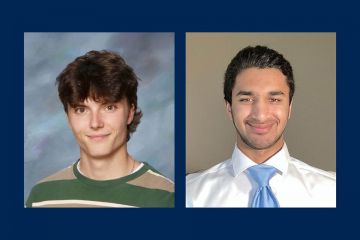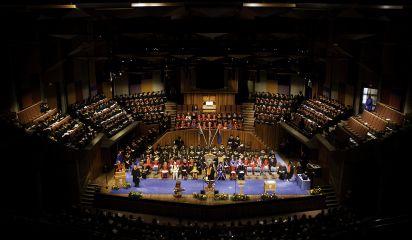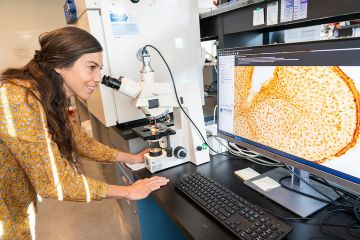The Science of Sound, Acoustics specialists gather at UVic conference
Underwater sound, acoustical needs of the hard of hearing, effects of man-made noise on marine mammals, and the acoustics of singing styles will be on the agenda when UVic's Centre for Earth and Ocean Research hosts the Canadian Acoustical Association annual meeting Oct. 18-19 at the Laurel Point Inn.
"The association is really an umbrella organization for researchers working in many different fields of acoustics--architecture, engineering, noise and speech," says Dr. Stan Dosso, conference chair and UVic ocean acoustics researcher.
Ocean acoustics research at UVic focuses on the use of sound to locate and analyse seafloor gas hydrates, a potential major energy source. The group also studies underwater ambient noise to assess the subsea environment and sound sources.
Among the 70 research presentations:
¥ Dr. Charles Laszlo (UBC) is profoundly hard of
hearing and a biomedical engineer concentrating on different aspects
of hearing. "The acoustical treatment of living spaces is generally
inadequate and people in general have no idea how to control noise in
their homes. I will challenge the Canadian acoustics community to
focus attention on the needs of hard of hearing people in individual
homes and personal spaces."
Dr. Laszlo opens the conference with this talk, 8:30 to 9:10 a.m.,
Oct. 18.
¥ Dr. Christine Erbe (Institute of Ocean Sciences)
has developed software to assess the impact of noise on Canadian
marine mammals (Steller sea lions, polar bears, and beluga, blue and
right whales). "I'm going to present this impact assessment model and
apply it to the case of icebreakers affecting beluga whales in the
Beaufort Sea." Erbe is also in the early stages of studying the
effects of noise from whale watching boats on orca pods around
southern Vancouver Island. Erbe conducted her post-doctoral work at
UVic.
Dr. Erbe addresses the conference from 8:30 to 9:10 a.m., Oct.
19.
¥ Anne Bateman (UVic) is working toward an
interdisciplinary masters degree in music, linguistics and
engineering. She'll present results of her case study comparing seven
popular singing styles--classical, country, jazz, legit, rhythm and
blues, pop and belt. Using computer-based analysis, Bateman's
objective is to provide visual tools for voice coaches. "Learning to
sing isn't like learning to play the piano, where you can see whether
your fingers are on the right keys. In singing, you can't look at
vocal chords to see if you've got it right." Existing voice quality
research has mostly dealt with opera. Bateman also teaches voice at
the Victoria Conservatory of Music.
Bateman presents her research at 11:00 a.m., Oct. 19.
As well, UVic graduate Nicole Collison (MSc '99) will be presented with the national Fressendon Prize for her thesis on localizing underwater sound sources.
-- 30 --
In this story
Keywords: science, sound, acoustics, specialists, gather, uvic, conference




